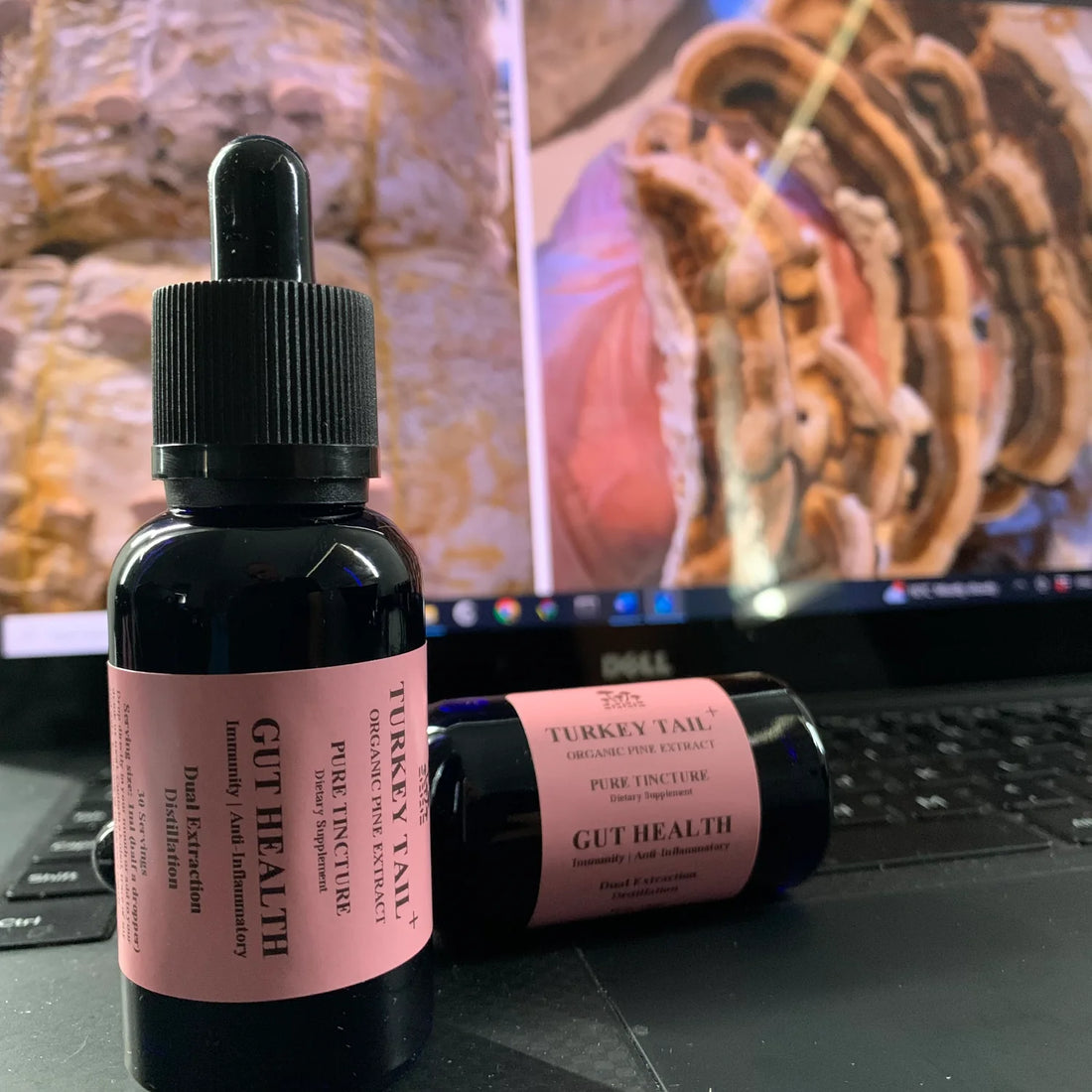
Mushborn's Mushroom Tinctures: Elevate Your Daily Health
One of our principal missions at Mushborn is to grow a wide variety of healthy mushrooms and derive essential compounds from our mushrooms that provide health and cognitive benefits. We then distil these compounds into condensed products, including powders, coffee, oral mists, dietary supplements, and tinctures, making it easy to include these medicinal compounds in our everyday routines.
To begin producing our mushroom tincture, we harvested our fruited mushrooms and added them to a sealed alcohol solution. Over the following weeks, we may adjust the concentration and add complementary solutions to extract our targeted compounds best. Once the compounds have been separated in solution, we siphon the mixture through several cycles of straining, followed by distillation. Finally, we recombine the desired chemical components to produce our final tincture. Two of our most popular tinctures are derived from New Zealand Lion’s mane mushrooms (Hericium Novae Zealandiae) and Turkey Tail mushrooms (Trametes Versicolor).
Our Lion’s mane tincture contains heightened polysaccharides, particularly beta-glucans, that promote neural growth and health. As a result, these compounds have been linked to relieving anxiety, depression, and other mental disorders, in addition to improving sleep and overall cognitive function [1]. Lion’s mane is also concentrated in erinacines and hericenones, further stimulating neural synthesis [2]. Polyphenols and other antioxidants in the tincture support heart health and blood circulation, as well as maintaining healthy levels of cholesterol [3,4]. Recent studies have linked lion’s mane extract to inhibiting metastasis of cancer cells [5], although the compounds responsible for this have yet to be definitively determined; nevertheless, this is quite a comprehensive medicinal profile from a single extract.
Our Turkey tail tincture is also concentrated in mushroom-derived polysaccharides, specifically those bound by proteins, known in conjunction as polysaccharopeptides [6]. Krestin (PSK) and polysaccharide peptide (PSP) produced by turkey tail bolster the immune system and reduce inflammation [7] (the targeted effect of our mushroom elixir derived from turkey tail). These polysaccharopeptides also are used in cancer treatments such as chemotherapy, and therefore, regular supplementation has been linked to reducing cancer risk [8]. Turkey tail has historically been used in medicinal immune system treatments, now known to be primarily due its extreme levels of antioxidants including phenols and flavonoids [9]. Recent research has also linked turkey tail extract to promoting digestive health through cultivating populations of healthy gut bacteria [10].
Our tinctures make it easy to add these specialised health-enhancing compounds to your daily routine, whether by cultivating healthy gut bacteria populations. You decide to pursue the therapeutic profile of lion’s mane, turkey tail, or perhaps a complimentary regiment of both. As you have learned, many of our adaptogenic mushrooms share essential core health benefits but vary widely in their targeted medicinal effects. To maximise the health benefits of the tincture, we recommend adding a few drops to your tongue three to five times a day. We hope you share our passion for the transformative health properties of our mushrooms and now have some insight to elevate your daily routine towards greater vitality and tranquillity. If you are interested in learning more about these mushroom varieties and tinctures or similar products, please access our chat or email us at sales@mushborn.com!
References
- Friedman, Mendel. “Mushroom Polysaccharides: Chemistry and Antiobesity, Antidiabetes, Anticancer, and Antibiotic Properties in Cells, Rodents, and Humans.” Foods, vol. 5, no. 4, Nov. 2016, p. 80. DOI.org (Crossref), https://doi.org/10.3390/foods5040080.
- Lai, Puei-Lene, et al. “Neurotrophic Properties of the Lion’s Mane Medicinal Mushroom, Hericium Erinaceus (Higher Basidiomycetes) from Malaysia.” International Journal of Medicinal Mushrooms, vol. 15, no. 6, 2013, pp. 539–54. DOI.org (Crossref), https://doi.org/10.1615/IntJMedMushr.v15.i6.30.
- Kim, Seonghun. “Antioxidant Compounds for the Inhibition of Enzymatic Browning by Polyphenol Oxidases in the Fruiting Body Extract of the Edible Mushroom Hericium Erinaceus.” Foods, vol. 9, no. 7, July 2020, p. 951. DOI.org (Crossref), https://doi.org/10.3390/foods9070951.
- Tachabenjarong, Nattapat, et al. “Bioactive Compounds and Antioxidant Activity of Lion’s Mane Mushroom (Hericium Erinaceus) from Different Growth Periods.” E3S Web of Conferences, vol. 355, 2022, p. 02016. www.e3s-conferences.org, https://doi.org/10.1051/e3sconf/202235502016.
- Kim, Sung Phil, et al. “Hericium Erinaceus (Lion’s Mane) Mushroom Extracts Inhibit Metastasis of Cancer Cells to the Lung in CT-26 Colon Cancer-Tansplanted Mice.” Journal of Agricultural and Food Chemistry, vol. 61, no. 20, May 2013, pp. 4898–904. DOI.org (Crossref), https://doi.org/10.1021/jf400916c.
- Lo, Hui-Chen, et al. “Extracellular Polysaccharopeptides from Fermented Turkey Tail Medicinal Mushroom, Trametes Versicolor (Agaricomycetes), Mitigate Oxidative Stress, Hyperglycemia, and Hyperlipidemia in Rats with Type 2 Diabetes Mellitus.” International Journal of Medicinal Mushrooms, vol. 22, no. 5, 2020, pp. 417–29. DOI.org (Crossref), https://doi.org/10.1615/IntJMedMushrooms.2020034560.
- Habtemariam, Solomon. “Trametes Versicolor (Synn. Coriolus Versicolor) Polysaccharides in Cancer Therapy: Targets and Efficacy.” Biomedicines, vol. 8, no. 5, May 2020, p. 135. DOI.org (Crossref), https://doi.org/10.3390/biomedicines8050135.
- Brown, Dorothy Cimino, and Jennifer Reetz. “Single Agent Polysaccharopeptide Delays Metastases and Improves Survival in Naturally Occurring Hemangiosarcoma.” Evidence-Based Complementary and Alternative Medicine, vol. 2012, 2012, pp. 1–8. DOI.org (Crossref), https://doi.org/10.1155/2012/384301.
- Bains, Aarti, and Prince Chawla. “In Vitro Bioactivity, Antimicrobial and Anti-Inflammatory Efficacy of Modified Solvent Evaporation Assisted Trametes Versicolor Extract.” 3 Biotech, vol. 10, no. 9, Sept. 2020, p. 404. DOI.org (Crossref), https://doi.org/10.1007/s13205-020-02397-w.
- Yu, Zhuo-Teng, et al. “Trametes Versicolor Extract Modifies Human Fecal Microbiota Composition In Vitro.” Plant Foods for Human Nutrition, vol. 68, no. 2, June 2013, pp. 107–12. DOI.org (Crossref), https://doi.org/10.1007/s11130-013-0342-4.